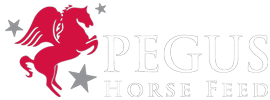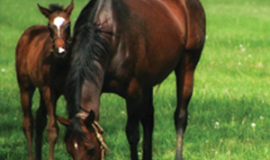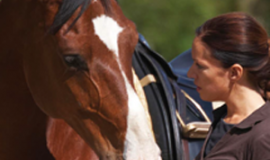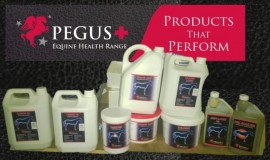Riboflavin (Vitamin B2)
B-vitamins are a group of 8 water soluble vitamins that play important roles in cell metabolism. They can not be produced by the body itself, but can be produced by bacteria, fungi and plants. In the horse, microorganisms in the gut (mainly the hind gut) is capable of synthesizing B-vitamins and nutrient requirements have only been established for thiamin (B1) and riboflavin (B2). In this article we will look at the function, dietary sources and requirements for riboflavin (vitamin B2).


Function
Riboflavin is a precursor to the coenzymes flavin adenine dinucleotide (FAD) and flavin mononucleotide (FMN). Both are involved in oxidation-reduction reactions used in energy metabolism (ATP synthesis), lipid metabolism and antioxidant defense mecanisms.
Dietary sources
Riboflavin is found in relatively high concentrations in legumes like lucerne and clover and slightly less in grass hays (see table).
Legumes 13-17 mg/kg DM
Grass hays 7-10 mg/kg DM
Cereal grains 1.4-1.7 mg/kg DM
These concentrations of riboflavin in feeds will be reduced to about 70% during 1 year storage.
Riboflavin is included in most concentrate mixtures for horses (5 – 15 mg/kg) and in vitamin supplements.
Requirements
Riboflavin is absorbed with decreasing efficiency with increasing amounts ingested. Excess is rapidly excreted in the urine, and there is little storage in the body.
The NRC 2007 gives requirements for riboflavin for horses (see table).
Maintenance 0.04 mg/kg body weight
Light exercise 0.04 mg/kg body weight
Moderate exercise 0.04 mg/kg body weight
Heavy exercise 0.05 mg/kg body weight
Very heavy exercise 0.05 mg/kg body weight
Pregnant mares 0.04 mg/kg body weight
Lactating mares 0.05 mg/kg body weight
Growing horses 0.05 mg/kg body weight
Deficiency
Riboflavin is produced by microorganisms in the intestine of the horse and deficiency has not been described.
Toxicity
As riboflavin is a water-soluble vitamin, excess intake will be excreted in the urine. Riboflavin toxicity in horses has never been reported.
Pegus PC-Horse
Pegus PC-Horse calculates requirements for riboflavin individually for each horse according to the NRC recommendations. It has also included values for riboflavin (vitamin B2 ) in all feed tables. When composing rations for your horse using Pegus PC-Horse, you will always be able to control that your horse’s riboflavin intake is in accordance with its requirements.
Getting the Balance correct.
Today many riders and owners , are totally unaware of the diet profile , when providing the finished feed for their horses it likely contains a complete feed , supplements , additives extra oils .Which when all the finish nutrients are now added up can be seriously over supplemented and unbalancing . Affecting the key function of key minerals and vitamins in the horses diet.
Contact Pegus Horse Feed for information on diets for your horse or pony visit
www.pegus.ie or e-mail info@pegus.ie
Free Phone Helpline R.O.I.= 1800-378463 UK = 0800 011 4182 or call ++447710883088







